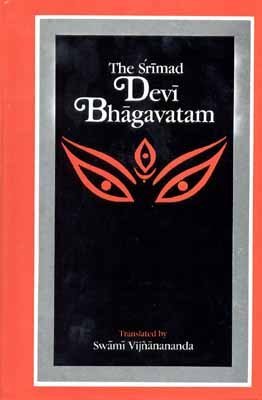The Devi Bhagavata Purana
by Swami Vijñanananda | 1921 | 545,801 words | ISBN-10: 8121505917 | ISBN-13: 9788121505918
The English translation of the Devi Bhagavata Purana. This Sanskrit work describes the Devi (Divine), the Goddess, as the foundation of the world and as identical with Brahman, the Supreme Being. The Devi Bhagavata Purana is one of the most important works in Shaktism, a branch of Hinduism focusing on the veneration of the divine feminine, along w...
Chapter 21 - On the narrative of hells
1-9. Nārāyaṇa said :-- O Devarṣi! Sanātana, the son of Brahmā, recites thus in the assembly of the Devas, the glories of the Bhagavān Ananta Deva, and worships Him, thus :-- How can one of ordinary sight and understanding grasp the real nature of Brahmā, Whose mere Glance enables the Prakriti work Her Guṇas in the Creation, Preservation and Destruction of this Universe! Him Whose nature has no beginning nor end; Who though One, has created all this Prapañca (the universe of five elements) as a covering to the Ātman (the True Self). He has made the Sat and Asat, out of his infinite compassion, this universe, full of cause and effect, visible in His One and only one Śuddha Sattva nature where even the very powerful lion is imitating his Leelā (Pastime), void of all defects, to bring under His control the minds of His own kinsmen.
(Note :-- This Ananta Deva is the Ruling Principle in the Fourth Dimensional Space.) To Whom else, then, the persons, desirous of Mokṣa, will take refuge, the mere hearing or reciting Whose Name, in a fallen or a distressed condition, or merely in jest, takes away instantly all the sins! He is upholding the earth with the mountains, oceans, rivers and all the beings as if an atom on his thousand heads. He is infinite. His power knows no decrease in any time. No one can describe his actions even if one had thousand tongues to speak. He is of an infinite strength, of the endless high qualities and of unlimited understanding. Thus staying at the bottom of the earth, the Bhagavān Ananta Deva is upholding with ease this earth for her protection, unaided and independent. O Muni! The people get the fruits of their actions and desires as they want and as they have followed the paths laid down in the Śāstras and become accordingly kings, men, deer or birds or other creatures in other states. O Nārada! This I have described, as you questioned me before, the various and dissimilar fruits of various actions, done according to the dictates of the Dharma and the Śāstras.
10. Nārada said :-- “O Bhagavān! Kindly describe to me now why has the Bhagavān created so many diversities, when the Karmas, done by the Jīvas, are the same.”
11-28. Nārayaṇa said :-- O Nārada! So many different states arise because the Śraddhās of the doers are so very different. The fruits differ because the Śraddhās vary, some being Sāttvik, some Rājasik and some Tāmasik. If the Śraddhā be Sāttvik, happiness comes always; if it be Rājasik, incessant pain and misery is the result; if it be Tāmasik, misery comes and the loss of the knowledge of good or bad is the result. Thus the fruits differ as the Śraddhā varies. O Best of Dvījas! Thousands and thousands of states occur to a man as the result of their Karmas, done under the influence of the beginningless Avidyā (Nescience). O Dvījottama! I will now deal in detail with their varieties; hear. Behind this Triloki, below this earth and over the Atala, the Pitris named Agniṣvāttas and other forefathers live. Those Pitris stay there, and, practising deep Samādhis, they offer always, to their best blessings to their own Gotra (families) respectively. There Yama, the God of the Pitris gives punishment to the dead brought there by His messengers according to their Karmas and faults. By the command of the Bhagavān, the Yama, surrounded by his own Gaṇas (persons), judges and does full justice according to the Karmas that they had done and the sins they had committed. He sends always those of his messengers who obey his order and know the Tattva of Dharma, and who are posted to their respective duties to carry out what He commands. The writers of the Śāstras describe twenty-one Narakas or hells; others say there are twenty-eight hells.
Now hear their names :-- Tāmisra, Andha Tāmisra, Raurava, Mahāraurava, Kumbhīpāka, Kālasūtra, Asipatrakānana, Śūkaramukha, Andhakūpa, Krimibhojana, Taptamūrti, Samdaṃśa, Vajrakaṇṭaka, Śālmalī, Vaitaraṇī, Pūyoda, Prāṇarodha, Viśasana, Lālābhakṣa, Sārameyādana, Avīci, Apahpāna, Kṣārakardama, Rakṣogaṇa, Sambhoja, Śūlaprota, Dandaśūka, Avaṭārodha, Paryāvartanaka, and Sūcimukha. These are the twenty-eight Narakas or hells. (N.B. These are 29).
These hells are very tormenting. O Son of Brahmā! The embodied beings (jīvas) suffer these according to their own Karmas respectively.
Here ends the Twenty-first Chapter of the Eighth Book on the narrative of hells in the Mahā Purāṇam, Śrī Mad Devī Bhāgavatam, of 18,000 verses, by Maharṣi Veda Vyāsa.
